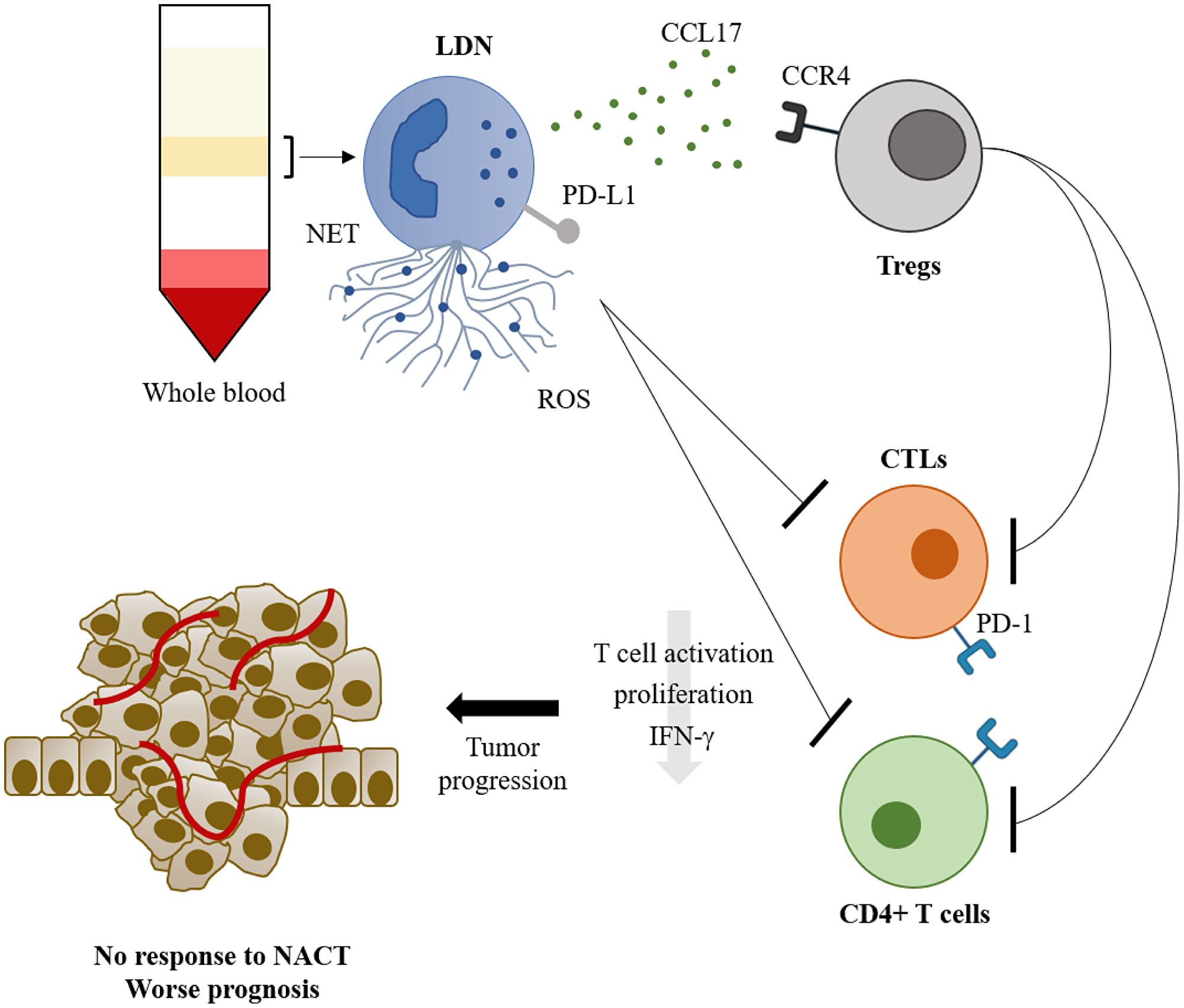Oncotarget published "Circulating low density neutrophils of breast cancer patients are associated with their worse prognosis due to the impairment of T cell responses" which reported that here, the authors observed that LDN were increased in the blood of breast cancer patients, particularly with metastatic disease.
Within the population of non-metastatic patients, LDN were more prevalent in patients with poor response to neoadjuvant chemotherapy than patients with a good response.
The higher incidence of LDN in BC patients with severe disease or resistance to treatment can be explained by their pro-tumor/immunosuppressive characteristics.
Moreover, the percentage of LDN in BC patients' blood was negatively correlated with activated cytotoxic T lymphocytes and positively correlated with immunosuppressive regulatory T cells.
Hence, this study reveals the potential of LDN as a biomarker of BC response to treatment and opens new avenues for developing new immunotherapies.
This study reveals the potential of LDN as a biomarker of BC response to treatment and opens new avenues for developing new immunotherapies
Dr. M. Guadalupe Cabral from The Universidade Nova de Lisboa said, "Breast cancer (BC) is the main type of cancer in women worldwide, with more than 2 million new cases per year."
Tumors have complex mechanisms to escape immune surveillance and, in addition, both lymphocytes and neutrophils are composed of different cell subtypes with opposite functions, which can explain why these markers of BC response to treatment are still scarcely used in a clinical routine.
Mirroring the polarization of TANs, circulating neutrophils can also be divided into two subpopulations - high density neutrophils and low density neutrophils, distinguished based on their density gradient, which are phenotypically similar to N1 and N2, respectively.
Besides these mechanisms, immunosuppressive neutrophils were shown to express the programmed cell death ligand 1, which is an immune checkpoint that hampers effector T lymphocytes' response, when bound to its receptor PD-1. The role of LDN in cancer have been intensively studied in the past years, mainly in animal models, and it was observed that this subset of neutrophils also has the capacity to promote metastization of cancer cells, due, in part, to its extraordinary ability to release neutrophil extracellular traps to the environment, which can entrap circulating tumor cells and help in their migration towards secondary niches.
More specifically, these results suggested that in non-metastatic BC, LDN can predict the response to NACT, as patients with poor response to this treatment showed an increased percentage of LDN pre-treatment.

Figure 5: The role of low density neutrophils in breast cancer prognosis and response to neoadjuvant chemotherapy. Low density neutrophils, isolated from the peripheral blood mononuclear cell layer after whole blood density centrifugation, have a high capacity to release extracellular traps (NETs) and reactive oxygen species (ROS), express PD-L1 and release CCL17. CCL17 will recruit CCR4+ regulatory T cells (Tregs) which will inhibit CD4+ T cells and cytotoxic CD8+ T lymphocytes (CTLs). This inhibitory action on T lymphocytes can also be achieved directly from the low density neutrophils. The inhibition will lead to lower T lymphocytes' activation, proliferation and IFN-γproduction, leading to tumor progression, and consequently poor response to neoadjuvant chemotherapy (NACT) and worse prognosis.
Additionally, they performed a thorough phenotypic and functional characterization of these BC patient-derived LDN in comparison to HDN and demonstrated that LDN are highly activated neutrophils; with increased capacity to phagocyte bacteria, produce ROS and form NETs; and with an immunosuppressive action towards CD4 and CD8 T lymphocytes, which may justify our clinical observations.
The Cabral Research Team concluded in their Oncotarget Research Output that this study demonstrates that LDN have an important role in breast cancer progression, as well as the potential to be used as a predictive marker of response to NACT.
Nevertheless, further studies need to be conducted to validate this marker.
Additionally, due to the immunosuppressive action of LDN in effector T lymphocytes, new targeted immunotherapies could be developed, to inhibit LDN activity and, consequently, release its inhibitory effect on effector cytotoxic T lymphocytes.
Therefore, LDN-target immunotherapies that could assist in the treatment of breast cancer patients with poor response to standard chemotherapy still need to be developed.
Although further studies are needed, these results suggest that CCL17 may be a potential therapeutic target.
Sign up for free Altmetric alerts about this article
DOI - https://doi.org/10.18632/oncotarget.28135
Correspondence to - M. Guadalupe Cabral - [email protected]
Keywords - breast cancer, chemotherapy response, tumor-associated neutrophils, low density neutrophils, biomarker
About Oncotarget
Oncotarget is a biweekly, peer-reviewed, open access biomedical journal covering research on all aspects of oncology.
To learn more about Oncotarget, please visit https://www.oncotarget.com or connect with:
SoundCloud - https://soundcloud.com/oncotarget
Facebook - https://www.facebook.com/Oncotarget/
Twitter - https://twitter.com/oncotarget
LinkedIn - https://www.linkedin.com/company/oncotarget
Pinterest - https://www.pinterest.com/oncotarget/
Reddit - https://www.reddit.com/user/Oncotarget/
Oncotarget is published by Impact Journals, LLC please visit https://www.ImpactJournals.com or connect with @ImpactJrnls
Media Contact
[email protected]
18009220957x105



